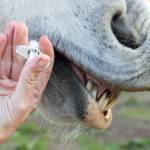Horse Parasites: Control Through Nutrition

Although there is no such thing as a parasite-free horse, it is important to control internal parasites to ensure maximal health. Appropriate parasite control measures will also help minimize the deleterious effects of parasites, which can include poor coat, weight loss, anemia, colic, diarrhea, and in some cases, death.
Classic methods of parasite control in horses include chemical dewormers. However, there is concern regarding the growing resistance to such dewormers, meaning they do not work as well as they used to, if at all in some cases, and the lack of new chemical options.
Several “natural” remedies for deworming horses have been discussed over the years. Some examples include boosting the immune system, feeding herbs (e.g., garlic, rosehip, kelp, seaweed, etc.), and prebiotic and probiotic administration to promote gastrointestinal tract health. Some horse owners swear by other alternatives such as diatomaceous earth, raw pumpkin seeds, and carrots. There is a lack of evidence to support the efficacy of these approaches, and internet testimonials and phrases such as “more effective during a full moon” make scientists and evidence-based medicine followers suspicious.
However, some studies support the notion that nutritional supplementation can help control parasites. Although most studies in this field have been conducted in ruminants, one group of French researchers* designed a study to assess nutritional supplementation on parasite burden in lactating saddle mares. All mares were grazed on a permanent fertile pasture and half of the mares were supplemented with barley, which reportedly reduces nematode (roundworm) egg excretion in grazing sheep.
During the five-month study period, fecal egg counts increased from 150 to over 2,000 eggs/gram of feces, which is 10 times higher than the accepted 200 eggs/gram of feces that is currently the cutoff point for anthelmintic treatment (chemical deworming). Further, fecal egg excretion did not differ between the mares that were or were not supplemented with barley, but the study authors suggested additional research is warranted, concluding, “Due to the severe challenges caused by gastrointestinal nematodes of horse performance, welfare and health, it is important to test whether other types of supplementation could reduce horse parasite burden.”
*Collas, C., G. Fleurance, J. Cabaret, et al. 2014. How does the suppression of energy supplementation affect herbage intake, performance and parasitism in lactating saddle mares? Animal Jun 2:1–8.








